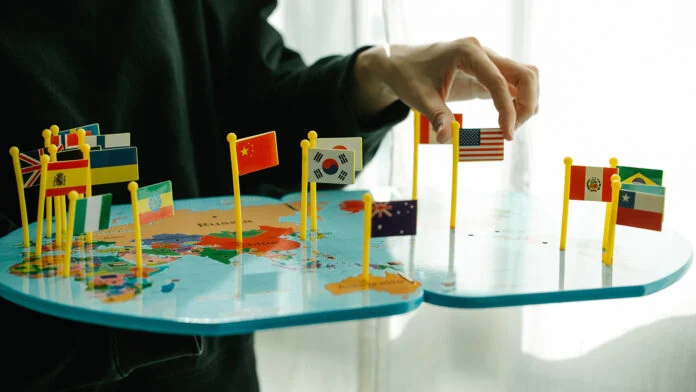Article by Tim Feran, originally posted on Columbus Underground
Russia’s invasion of Ukraine, increased tensions between the United States and China, a global pandemic that left millions dead and economies staggering — the state of the world has gotten a lot worse in the five years since a United Nations diplomat last stopped in Columbus.
“I’m really worried,” said David Chikvaidze, cabinet chief for the U.N.’s Office of the Director-General in Geneva, Switzerland.
Chikvaidze was the featured speaker at the Columbus Metropolitan Club Wednesday, April 19, 2023, recounting his experiences in various diplomatic posts, both at the U.N. and for the now-departed Soviet Union.
In 2018, Chikvaidze was most concerned about the growing numbers of refugees worldwide.
But the deterioration of international affairs in the past few years caused Chikvaidze to reminisce about the days when the Cold War between the United States and the Soviet Union was winding down.
“My beginning was as a Soviet diplomat,” he told the program’s moderator Colleen Marshall, anchor at WCMH-TV NBC4. “I was in Washington, D.C., in 1985 and it was a totally different time. It was a heyday for relations between the United States and the Soviet Union. You didn’t feel a divide. There was increasingly friendly dialogue.
“When you see what is happening now between Russia and the United States, it’s just night and day.”
Before becoming an official at the United Nations 30 years ago, Chikvaidze was scheduler for Soviet President Mikhail Gorbachev and was protocol officer for Russian President Boris Yeltsin. Before that he was special assistant to the Soviet Ambassador and chief of protocol of the USSR Embassy in Washington, D.C., from 1985 to 1990.
Born in Tbilisi, Chikvaidze is a citizen of the country of Georgia, a fact that became important when the Soviet Union collapsed in 1991, leading to more than a dozen former Soviet states — including Georgia — to become new nations.
“I knew what was coming,” he said of the Soviet Union’s end. “When it happened it was, ‘Okay, where do I go from here?’ It was a totally different feeling for my colleagues — they were Russian; I was in a totally different country. It was a major change.”
The years after the dissolution of the Soviet Union were filled with political, economic, military and cultural turmoil for Russia and its former Soviet states.
“Did we do a good job learning the lessons of that period? I’m not sure we did,” he said.
“The United States and the Soviet Union were two of the biggest boys on the block. But the Soviet Union always had feelings of inferiority. The Soviet Union wanted parity, a rough equivalency in nuclear weapons … and did achieve rough parity.”
During the final years of the Soviet Union, President Gorbachev formed a friendly relationship with President Ronald Reagan.
“The relationship was good. There was no thunder from the right — Reagan was the right.”
But by the time Chikvaidze visited Columbus in 2018, there were new leaders in the United States and Russia, and ”the rhetoric had already gone sour.”
Part of the problem between the United States and Russia, he said, “is on the Russian side there are two syndromes. There’s what I call the Rodney Dangerfield Syndrome — they feel they ‘get no respect,’” in part because, “what collapsed in 1991 was not just a country but a sphere of influence.”
The other syndrome, Chikvaidze said, “was the Glenn Close Syndrome — from Fatal Attraction, when she tells Michael Douglas ‘I will not be ignored.’
“There’s a lot of material for a whole conference in psychology,” he said, sighing.
Today there are three dominant powers in the world — not just the United States and Russia, but China as well — and that makes the job of the United Nations even more difficult.
“When I hear, ‘Why can’t the U.N. stop the conflict in Syria?’ I ask, Which U.N.? Is it my boss? Is it the Security Council? Or is it the five permanent members of the Security Council?
“It’s not the bureaucrats like me who make the decisions, it’s the client states.”
The enormous task of getting everyone to cooperate was illustrated by a story that Chikvaidze told from the 1990s. Three months after Ghanaian diplomat Kofi Annan became United Nations Secretary General in 1997 he was asked, “Why has there been no action after three months? After all, it only took six days to create the world.”
Chikvaidze chuckled at the U.N. leader’s reply.
“Kofi said, ‘But God was working alone.’”

